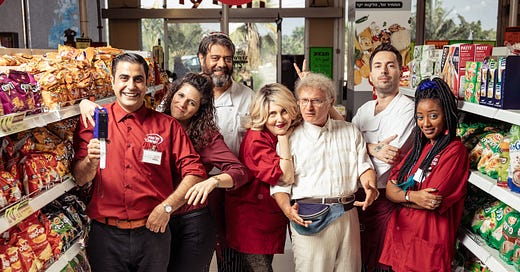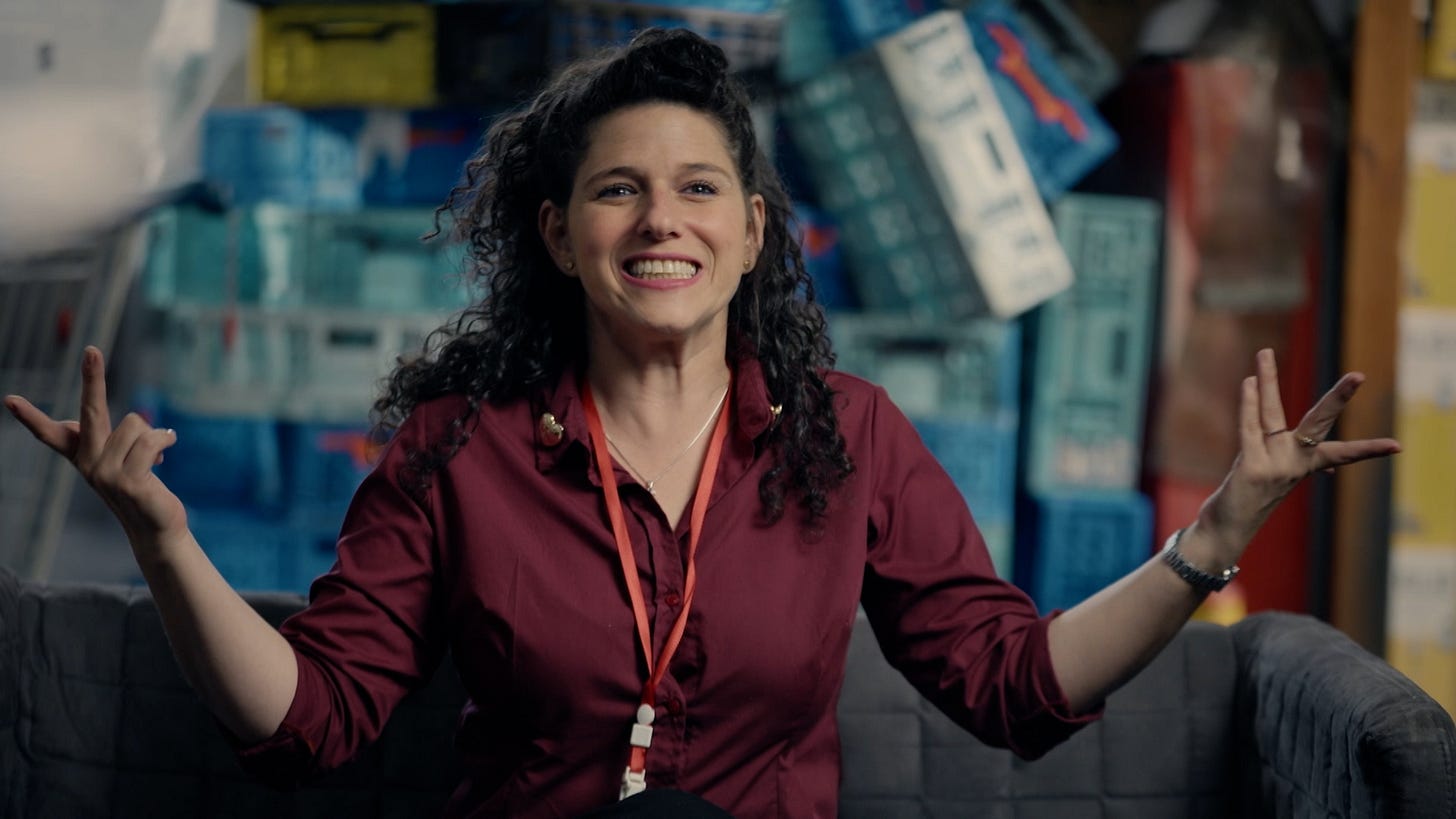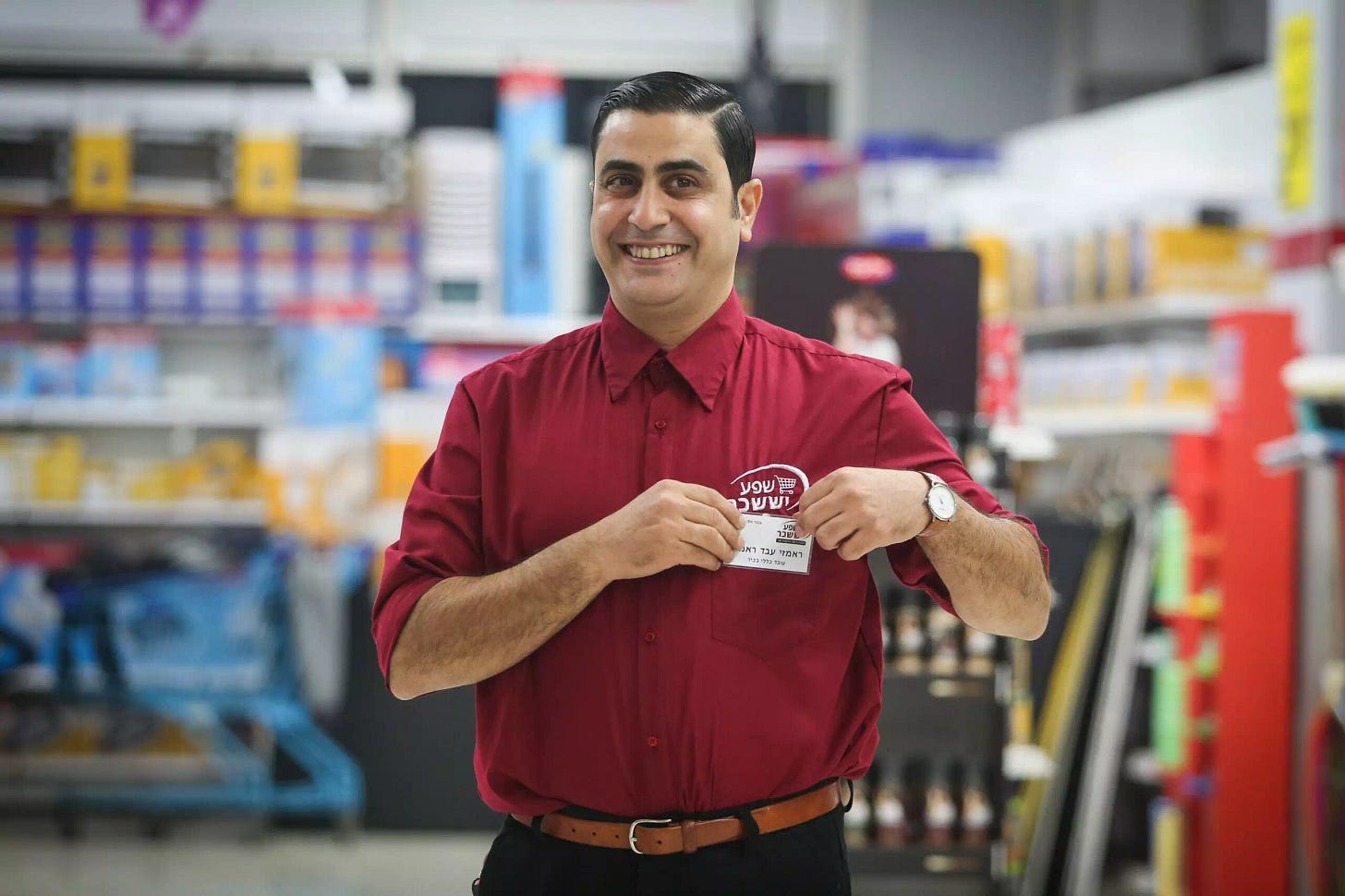The most popular TV sitcom in Israel takes place in a grocery store
"Checkout" or "Kupa Rashit" is a mockumentary-style show about a diverse microcosm of Israeli society.
Have you ever visited a grocery store in Israel? It’s an incredible multi-sensory experience. At the bakery section, there are trays laden with burekas and rugelach, sometimes stale, sometimes wafting the most delicious aroma. Moms and grandmothers line up to get a prime cut of meat or cold cuts at the butcher section, sometimes arguing about their place in line and making the person behind the counter assure them that what they are getting is indeed the best and freshest cut. In the dairy section, you can get nostalgic plastic bags of milk or chocolate milk. The walkways are often laden with boxes that need to be unpacked. And at the checkout, you will find people having soulful conversations with their cashiers about recent life events, calling them by their first names.
So it shouldn’t be surprising that the top Israeli sitcom takes place in a grocery store.
Since “The Office,” the TV workplace mockumentary has become a beloved and oft-used trope, and it is the chosen format of “Checkout,” whose fourth season is premiering with English subtitles on ChaiFlicks this week at the same time that its fifth season premieres in Israel.
In “Checkout,” a documentary crew follows the Yavne branch of the Shefa Isaschar grocery store staff and clients as they go through their day. Shop manager Shira Steinbuch (Israeli sensation Noa Koler of “Rehearsals,” “Fire Dance” and “The Wedding Plan”), a high-achieving goodie-two-shoes, gets on everyone's nerves with her stickler ways and her loud off-key singing. The women at the register are in fact the ones with all the power, especially bleached-blonde Kochava, played by Israeli comedian Keren Mor, known for many movie and TV roles including in the biting ‘90s satire show “Hahamishia Hakamerit,” who uses her pulpit at the cash register to make personal calls, share her love for Ladino music and wage wars with Amnon Tittinski, a particularly frugal university professor played by the dryly funny Dov Navon. Everyone, aside from a model employee or two, is trying to get away with doing the least, and the customers are doing the most to be unbearable. Basically, your average Israeli grocery store dynamics, heightened for maximum comedic effects. It’s kind of “The Office” meets the kvetchiness and anti-hero qualities of “Curb Your Enthusiasm,” a very fun combination of well-written and observed comedy about the minutiae of human interactions focused on something so haimish and familiar.
This isn’t a show where the characters reveal themselves as actually tender-hearted. Each character stays completely self-involved, in their own way, living in the separate lane of their own universe. But if you want to understand contemporary Israeli society, I would say that it’s a deeply illuminating show.
While the city of Yavne itself doesn’t boast a particularly diverse population, the inside of the supermarket (or “super” as Israelis call it) is a veritable microcosm of Israeli diversity. Ramzi Abed Ramzi (Amir Shurush) is a model senior employee whose Arab-Israeli parents both work in grocery stores. Nissim is one of the butchers in the shop, a ba’al teshuva, or secular-raised Jew who became more observant. His co-worker behind the butcher counter, Anatoly, or Sergein, is an oleh, a Jewish immigrant from Moldova with a heavy accent. Esty (Aviva Nagosa), a cashier, is an Ethiopian Jew, and Naomi (Mia Landsmann), a warehouse worker, is butch and queer.
While Israel is not known as a TV PC haven, at least not when it comes to comedy, the casting of this show is mostly what you would call authentic. Shurush, who plays Ramzi with a heavy Arab accent, grew up in a mixed home, with an Arab Christian father and a Jewish Yemenite mother. Daniel Styopin, who plays Anatoly, was born in Ukraine and only found out he was Jewish in first grade. Nagosa is the daughter of parents who came to Israel as part of Operation Brothers and even had a one-woman show called “Made in Israel” all about her identity as an Israeli-born Ethiopian Jew.
That doesn’t necessarily mean that “Checkout” has any incisive social commentary to impart. While its humor shows a deep understanding of the dynamics of Israeli society, many of its characters are quick to point out perceived and real discrimination against them, and the racist tensions that exist in Israeli societies make their ways into the show in the same way that they do into these types of spaces in real life, it’s happy to remain on the surface, mostly a comfort show there to make us laugh, always pulling back when it’s too close to making an overly inflammatory point about Israeli society.
That’s rarely more clear than it is in the third season episode “Ramzi Is Pure Forever.” A new employee joins the supermarket, Eliran, an ex-con and Beitar fan, the soccer team known for its racist chants against Arabs. Ramzi seems determined to win the new employee over, as he does every single person in the store. As Nissim tells Eliran, “He’s the biggest soul here.” But from the moment Eliran realizes Ramzi is an Arab, a “cousin” as Israelis say, he refuses to talk to him. Ramzi eventually does melt the wall between them by helping him hide contraband. Eliran, shocked by how much of a soft spot he has for Ramzi, says that he is not like any Arab he’s met before. The two are even seen singing an infamous inflammatory soccer team chant — “Listen you Arabs,” they chant together, wearing Beitar paraphernalia, as Eliran says, “Not you, Ramzi” and end with the chorus of “may your village burn down,” with Eliran again saying, “Not yours, Ramzi,” and Ramzi chanting along, “May your village burn down, not mine.”
The scene is meant to be funny, but it’s also jarring. And the show even seems to know this, juxtaposing this storyline with a particularly hilarious attempt by Kochava to manipulate the documentary crew into filming a wedding parody video for her son and his future husband. Eliran winds up getting arrested again for his contraband weapon business, and that storyline is sealed in one episode, but still, it leaves me with a strange feeling.
Turns out, that bit of the show is actually a mirror into Shurush’s experience growing up in Eilat, becoming friends with a lot of Beitar fans. His early childhood friends would hold “death to Arabs” signs. It hurt Shurush, obviously, who would go back every day to his very loving and supportive mixed home. And in the end, he used humor to cope, becoming a class clown.
Ramzi is painted as the only truly lovable character of “Checkout,” the only one not led by his own selfish interests. He is so completely devoted to every detail of working at the grocery store, from the well-being of the carts to special sales, refusing to take any days off (he’s accrued literal hundreds). Anyone he ends up with romantically, he says, would come fourth in his life — after the store, the clients and the other location of the grocery chain where he sometimes takes on a shift. He’s absolutely a crowd favorite and has so many brilliantly funny lines, but his Arab identity isn’t really a big part of his character development, aside from that thick accent, which is sometimes in itself the punchline. It’s clear that is also why he is so beloved, maybe the most popular Arab character to ever appear on Israeli TV, which has, to be fair, successful shows that center Arab characters, from the most recent and incredible “Night Therapy” starring Yousef Sweid and Shira Haas to “Arab Labor” created by author Sayed Kashua.
Part of what makes “Checkout” such a success is its appeal to all audiences. It’s the type of show you sit in your family living room to watch together, maybe even after a big family dinner — in that, it’s also so keyed into Israeli society, where watching TV is often a communal, familial experience. Kids dress up as its characters for Purim; the cast often is asked to send bat and bar mitzvah messages to kids. And for an all-ages audience, maybe it is just the right amount of satire.
“Checkout” and its cast see themselves as part of the community — in the days after October 7, the cast traveled around the country to comfort those who were injured and evacuated. The show was the only sitcom to shoot an actual episode to try to cheer up the nation, a war special that was meant to be a TV version of a hug. But if you watch carefully, you could find mirrors of the way, even beyond Israel, racism makes its way into our lives, particularly in a character like Steinbuch, who does her best to be PC but ends up at times being the most egregiously un-PC of them all.
It may be unfair of me to feel discomfort with the lack of incisiveness in “Checkout.” Israeli shows, like any shows, should be allowed to just be, and “Checkout” doesn’t ignore the flaws of Israeli society. Instead, through this set of characters searching mostly for their own personal happiness, it makes itself into a kind of comedy TV balm.
Have you watched “Checkout”? Have you been to an Israeli grocery store? Let me know in the comments!








Checkout is great, it reminds me a lot of Superstore in its type of humor and its social commentary, and I'm *really* glad that Chaiflicks exists and has become the reliable platform for this stuff because the main US streaming platforms rarely ever go for Israeli sitcoms and its just nice to have something beyond the spy thrillers readily available and with English subtitles
My son lived in Bat Yam where the shops had tons of Russian product. The store below his apartment was a little like a mini Zabars. Otherwise pretty on the money. With boxes everywhere. Product of indiscernible freshness. Etc. tbh. That’s pretty typical in most of the world for corner shops.